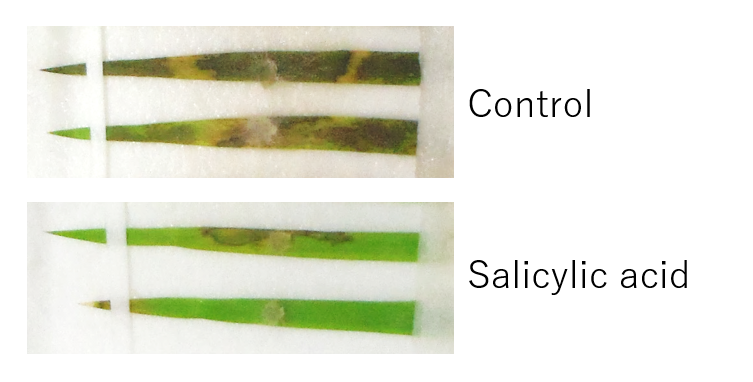Plant Pathology
The Food and Agriculture Organization (FAO) suggests that more than 800 million people in the world do not have enough to eat, causing 24,000 people to die from hunger daily. Actually, plant diseases annually cause a 20% yield loss in food and cash crops. With a rising population, an integrated system of plant protection must be sufficient to feed us now and in the near future. We therefore aim to elucidate the molecular mechanisms on plant diseases caused by pathogenic microorganisms and to develop new technology (control method) to prevent/reduce plant diseases.
|
Prof. TOYODA Kazuhiro E-mail: pisatin [at] cc.okayama-u.ac.jp plant pathology/molecular plant pathology/plant-microbe interactions
|
|
 |
Prof. NOUTOSHI Yoshiteru E-mail: noutoshi [at] cc.okayama-u.ac.jp Plant pathology/Plant immunity/Plant chemical biology/Infection strategy of filamentous plant pathogen/Plant defense activators/Biocontrol
|

Disease symptoms on Brachypodium distachyon caused by R. solani (top) and its suppression by induced defense through pretreatment with salicylic acid (bottom).
Infection Mechanism of the Filamentous Plant Pathogen Rhizoctonia solani
R. solani induces severe necrotic lesions on host plants. It has a wide host range and causes serious agricultural damage to various crops worldwide. Understanding the infection mechanism of the pathogen is essential to overcome plant diseases, but little progress has been made with this fungus due to the unavailability of genetic modification. We are tackling to elucidate the infection strategy by observing the hyphae during infection with confocal microscopy and by studying the immune responses of the host plants against this pathogen. Research Highlights
Identification of disease resistance inducers
Compounds that can activate plant immunity can be used as agrochemicals, called plant defense activators. Using our original screening methods, we are searching for leads of such molecules and elucidating their mechanisms of action.
Elucidating the action mechanism of plant rhizosphere microorganisms
Some microorganisms in the rhizosphere promote plant growth and suppress disease, and are expected to be used in agriculture for sustainable society. We are investigating the mechanisms of disease suppression and plant growth promotion of a biocontrol bacterium for grapevine crown gall disease.
